#Polyxena
Explore tagged Tumblr posts
Text

#once i will definitely write a big post on how odysseus treat other people' children#and yeah#this meme is a spoiler to the answer to this question#odysseus#telemachus#neoptolemus#iphigenia#polyxena#astyanax#the illiad#tagamemnon#greek mythology memes
288 notes
·
View notes
Text
achilles already got compensation as a warrior, multiple times over—both when he was alive, and when he actually died. by the time achilles' ghost appears and demands polyxena's sacrifice, he has been dead and properly honored long since. shades are not normatively entitled to compensation, let alone human sacrifice, after burial. they aren't supposed to be in the world of mortals anymore at all. hecuba is hardly an onlooker from a wildly different society when she argues that his sense of justice/dikê shouldn't need to be satisfied with innocent human life.
and anyway, this was a post about the emptiness of polyxena's death as much as it was about achilles. i am intentionally pushing against the text(s) here: i don't have to agree with them and say he's entitled to her life. if part of your argument here is that he never cared about kleos or timê at all (disregarding that when given the opportunity to leave and live a long life in the iliad, he eventually chooses kleos instead), then he has even less reason to demand a sacrifice.
speaking of achilles, i don't think he had his little underworld epiphany about the emptiness of kleos right away. because when his ghost demands that polyxena be sacrificed to him, regardless of if he wanted to marry her or if she participated in his death, for him it is always about entitlement to a status symbol. he believes that he's owed the same as all the other kings.
but he's not owed anything. he's dead. and the glory-shaped hole in his heart is never filled, and polyxena dies for nothing. girl as microcosm of the entire war
131 notes
·
View notes
Text
I actually hate it so much when retellings make it so Andromeda was willing to sacrifice herself, especially when it’s under the pretense of giving her “more agency”, bc her sacrifice is by definition the removal of her agency, something she tried to get away from so hard that they had to chain her just so they can leave her out to die.
It removes a very human element from her, it removes her fear, dread, hopes and dreams, her life with her friends and family taken from her through no fault of her own. So why make her self sacrificing to a fault? Why does every female character have to always put the needs of others before their own regardless of context? And why is that perceived as making a female character stronger or more complex? She’s not Iphigenia or Polyxena, she’s Andromeda.
It’s especially frustrating bc it’s only done to make Perseus look bad, not for Andromeda to “have her own voice”, bc Perseus literally and metaphorically freed her from this tragic fate and if we keep it that way then ppl might find Perseus complex and human and thats bad.
#greek mythology#ancient greek mythology#greek pantheon#perseus#andromeda#Persomeda#Perseus and andromeda#Cetus#Iphigenia#polyxena#princess andromeda
42 notes
·
View notes
Text

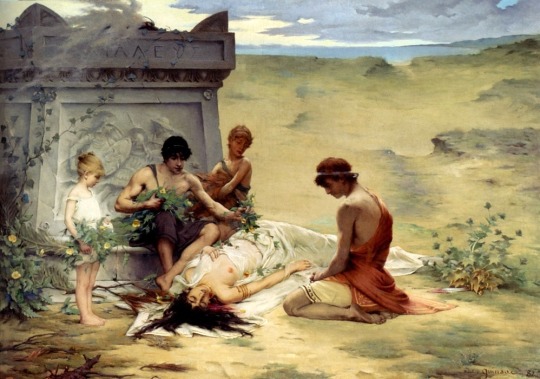

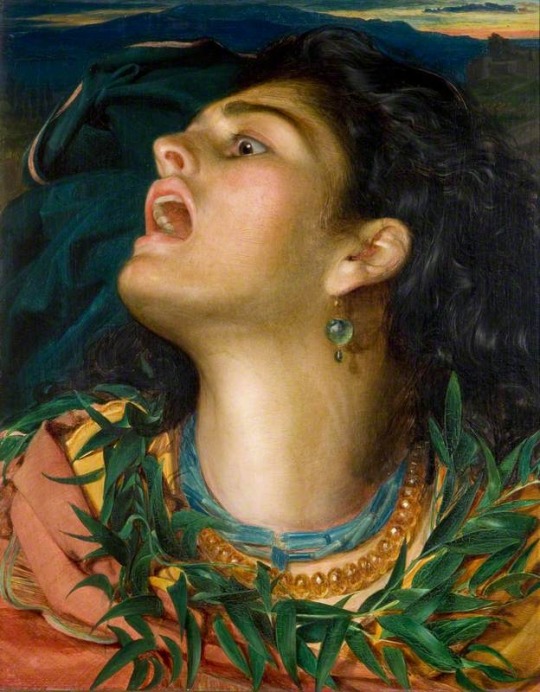

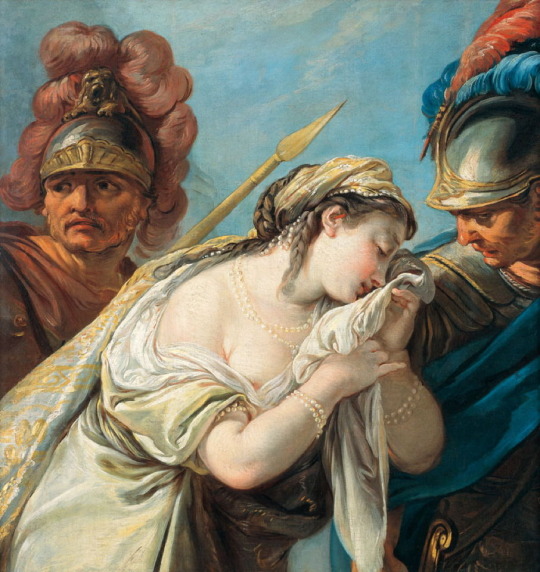

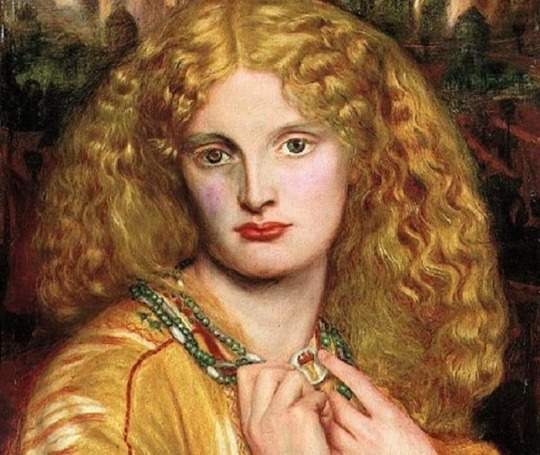

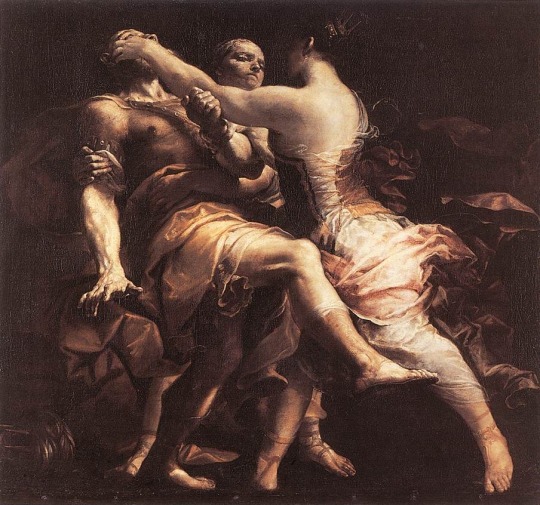
- just a girl x the women of the trojan war
#absolutely obsessed with Florence’s cover#no doubt#just a girl#florence + the machine#the Trojan women#trojan women#polyxena#helen of troy#Cassandra#Cassandra of Troy#Hecuba#briseis#art#pre raphaelite#lyrics#web weaving
263 notes
·
View notes
Text
I both love and hate Polyxena’s story.
I hate it because she deserved way better than what she got but I love it because she’s one of the only Trojan siblings who accomplishes any of their major goals.
I love that she played a part in the death of Achilles.
The guy had some audacity to think she’d want him after he savagely desecrated her brother Hector’s corpse, after he possibly raped but definitely savagely killed very young brother Troilus, and after he killed countless other brothers and relatives of hers.
I’m glad this teenage girl lured her pedophile tormentor to his death & even though she paid the price of her revenge with her own life, she died so bravely.
45 notes
·
View notes
Text
They are so cute together. <3
I want someone to draw Astyanax like this.

74 notes
·
View notes
Text

"Never again, never again shall I look on the light of the sun" - Euripides' Hekabe (transl. Anne Carson)
When the Greeks sail to Troy to retrieve Helen, wife of Menelaos, and lay waste to the city of Troy, the greek army is prevented from sailing on in Aulis. Artemis has been angered and demands a blood sacrifice in exchange for the winds that will carry the ships to the shores of Ilium.
So Agamemnon, chief commander of the army of Hellas, sacrifices his daughter Iphigenia at the altar of the goddess. Her death in exchange for eternal glory.
After the sacking of Troy, the remnants of the victorious greek army make ready to sail for home. But Achilles' vengeful ghost halts the winds, demanding proper sacrifice at his grave. Achilles demands blood in exchange for the winds that will carry the ships to the shores of Hellas.
So Odysseus and Agamemnon choose Polyxena, the youngest daughter of Priam and Hekabe, a princess of Troy. Her death in exchange for a homecoming worthy of the victors of Troy.
Though these two events are 10 years apart in the context of the story of the Trojan war, these two girls have always been connected with each other in my head. I imagine them at a similar age, looking similar even. I imagine Agamemnon thinking of Iphigenia as he watches Polyxena bleed out in front of him. Two sides of the same coin.
#iphigenia#polyxena#hekabe#hecuba#iliad#odyssey#homer#euripides#greek mythology#greek mythology art#ancient greece#greek myth#greek myth art#greek gods#iphigenia art#watercolour#traditional artwork
623 notes
·
View notes
Text

Imagine you have a lot of young siblings and Now there are thunder and lightning so they can't sleep, jump into your bed and scream 'Hector Hector'
some sketch in February, I love Trojan family.☺️❤️
#the iliad#trojan war#iliad#greek mythology#troy#tagamemnon#hector of troy#cassandra of troy#helenus#helenus of troy#cassandra#polyxena#troilus#sorry pairs But you are old enough to sleep alone#And we know he will jump into his elder brother's bed in the midnight
755 notes
·
View notes
Text


The Sacrifice of Polyxena
#men from left to right are:#agamemnon#odysseus#neoptolemus#the haunting spectre in the sky is#achilles#polyxena#polyxena of troy#epic cycle#homeric poems#the illiad#trojan war#tagamemnon#greek mythology#the trojan war#greek mythos#ancient greece#mythology fanart#fanart#my art#illustration#art#digital art#artist#digital fanart#digital illustration#men when i catch you men#inspired by a relief carving on a sarcophagus#historical art#tw blood
254 notes
·
View notes
Text
Ugh! I hate it when sources contradict each other and somehow ALL are awesome when I try to build my stories!
Take Troilus and Polyxena for example!
Ancient sources like we believe Cypria and all mention how Troilus was killed early on in the war when he was literally a child. The Iliad also implies that Troilus was already dead at that point given the speech given by Priam. However other sources indicate that Troilus was killed at the tenth year of the war which could imply that he was getting dangerously close to the age of 21 and sources like Aeneiad seem to also speak on the great talent of Troilus in battle.
On one hand it is the most ancient sources like Homer the ones that speak of Troilus being killed early and we assume he was literally a child! Which makes his death really tragic and sad (or even more disturbing given the OTHER interpretations that seem to be hinted by the vases aka the rape and beheading of Troilus in the altar) as well as the power imbalance and the potential foreshadowing of the brutality of taking of Troy or the madness of Achilles (in one way if we bind these sources with Statius Achilleid we COULD get a connection here but still seems like an overkill for Achilles that early on unless of course he was already charged up with the whole Aulis business)
On the other hand seems rather overkill that Athena sends the strongest of all Greeks to slaughter a child (not to mention what was a literal child doing alone with his horses out in the middle of a bloody war?) The brutality of the crime could be more explained if Achilles was swaying between reason and madness after the death of Patroclus (also Apollo being the father of Troilus could explain his hatred for the offspring of the God that helped to slay his companion) Troilus would still be young but also show a bit off his strength and the explanation as to why he absolutely HAD to be slaughtered so that he wouldn't be Hector #2 and lead the counter attack to the Greeks and it could explain why Athena sent Achilles of all people to slay Troilus (parallels and all) or the urgency for it.
So yeah! I am in a dead end 😫 hahahahaha all sources work so well and have life of their own and create their own individual stories! I might as well create different versions in the end (given that from those who didn't realize it yet I WAS planning to add Troilus one way or another to my Achillochus one-shot anthology)
And we also have Polyxena business and the death of Achilles! We do have the classical version of the story in which after Achilles loses Antilochus in battle he challenges Memnon in a duel and wins and then enraged he charges the attack against the Trojans and leads them close to the walls once more but eventually he is killed by Paris at the gates of Troy. But did you know that one version of the story indicates that Polyxena charmed Achilles so much that Achilles considered fucking treason? He goes to Priam and suggests that he will fight for him as long as he gets Polyxena as his wife. Priam is ecstatic and agrees but it seems that the whole thing is a ploy (most likely organized by his children rather than Priam himself). When Achilles is lured in the temple Paris is hidden in there and shoots Achilles and he dies.
Alright this is a bit easier for me to choose from because apart from the moment of the Iliad where Achilles wishes death to the Greeks to protect his honor, treason goes a bit too far even for him. I doubt he would just randomly switch sides because he wants to marry. If anything he would focus even more to burn Troy to the ground till he gets what he wants. And sure that could explain A BIT his ghost demanding Polyxena as he holds a grudge against her or something but still I'd say nah here. Maybe he was smitten for her but I doubt that he would betray everything he stands for in order to get her.
However I have to say even if I might as well go with the version that Achilles dies by the walls of Troy I find really interesting that there is a version in which the Trojans needed to perform a literal trick themselves because they wouldn’t think they could take Achilles down otherwise or Polyxena also taking some active role as a bait or potentially organizer and it is really tempting the idea of Paris coming out of a vase or something with his bow like "surprise motherfucker!"
Random thoughts
#greek mythology#tagamemnon#homeric poems#the iliad#homeric epics#iliad#achilles#troilus#polyxena#priam#athena#random thoughts#random post#thoughts from my brain#thoughts from the void#ancient greek sources#ancient sources#paris#paris of troy#achilles vs troilus#epic cycle#the epic cycle#cypria
49 notes
·
View notes
Text
Polyxena: The floor is lava! Helenus: *helps Cassandra onto the counter* Hector: *kicks Paris off the sofa* Helen: *lays on the floor* Polyxena: ...Are you okay? Helen: No.
#greek mythology#incorrect greek mythology#greek heroes#incorrect greek heroes#incorrect greek quotes#incorrect quotes#iliad#incorrect iliad#trojan royals#polyxena#helenus of troy#cassandra of troy#hector of troy#paris of troy#helen of sparta#helen of troy
147 notes
·
View notes
Text

Hecuba children height and age chart at the start of the war


How things stand at the start vs the end of the 10th year. Oof. (Ages/heights not adjusted)
#tagamemnon#greek mythology#classics#trojan heroes#ancient greek mythology#greek heroes#helenus#trojan war#the iliad#post the fall of troy#hector of troy#hektor of troy#deiphobus#polyxena#priam and the population crisis#trolius#paris of troy#polites#pammon#trojan Royal family#mestor of troy#cassandra of troy#helenus and cassandra#prophet of apollo
506 notes
·
View notes
Text

that one scene in hecuba
#i had to flip the image so the dialogue would read right. anyway. it's by michel martin drolling#odysseus#hecuba#hekabe#polyxena#anna.txt
2K notes
·
View notes
Text
“Agamemnon didn’t want to kill Polyxena!” He still enslaved and separated her family, sacked her city and raped her sister.
#if Agamemnon has a million haters and all that#and don’t technically me about wether his ‘relationship’ with Cassandra was consensual#I’m not in the mood#it’s not that I don’t think he’s a complex character I just don’t like him lol#greek mythology#ancient greek mythology#greek pantheon#agamemnon#Clytemnestra#cassandra#Polyxena#Hecuba#Troy#Iliad#Trojan war
58 notes
·
View notes
Text
Iphegenia and Polyxena are so similar just plot wise. They’re both young virgins who get sacrificed for good winds or appeasing someone. The Trojan War begins and ends w the killing of innocent lives. A bit more into speculation: i think the two have to gaslight themselves into believing this is the better way. Iphegenia adopts the “savior of greece” mindset and Polyxena has the much more tragic “its better than slavery.” They also both console their mothers that they’ll be alright and that their moms shouldnt be too sad or smth along the lines of that. Just something to think about.
#idk the details of polyxenas death very well so excuse me#ive read iphegenia in aulis but my memories a lil shitty#havent finishrd the trojan women yet but i just had a eureka moment#iliad#the iliad#tagamemnon#iphegenia#polyxena#trojan war#the trojan war#the epic cycle#epic cycle#greek mythology#greek mythos#greek myth#mafuyu loves homeric writing
28 notes
·
View notes
Text
It makes me so fucking mad that Polyxena died on the tomb of Achilles, the man that brutually murdered and possibly raped her young brother Troilus, defiled another brother Hector's corpse and murdered his way through her family tree.
The Greeks killed the men of Troy and raped and sold the women into sexual slavery. Don't ship Polyxena with those fuckers
21 notes
·
View notes